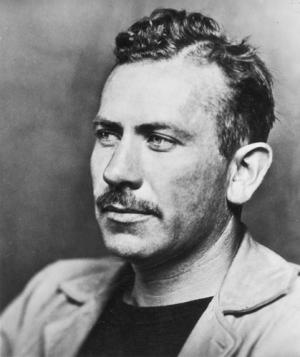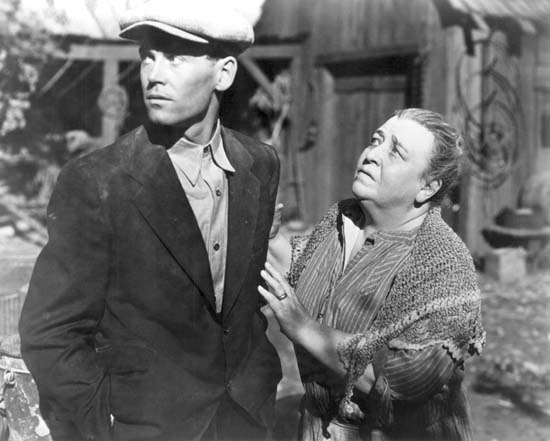

The narrative begins just after Tom Joad is paroled from prison for homicide. On his journey home, he meets a now-former preacher, Jim Casy, whom he remembers from his childhood, and the two travel together. When they arrive at his childhood farm home, they find it deserted. Disconcerted and confused, he and Casy go to his Uncle John's home nearby where he finds his family loading a converted Hudson truck with what remains of their possessions; the crops were destroyed in the Dust Bowl and as a result, the family had to default on their loans. With their farm repossessed, the Joads seek solace in hope; hope inscribed on the handbills which are distributed everywhere in Oklahoma, describing the beautiful and fruitful country of California and high pay to be had in that state. The Joads, along with Jim Casy, are seduced by this advertising and invest everything they have into the journey. Although leaving Oklahoma would be breaking parole, Tom decides that it is a risk, albeit minimal, that he has to take.
While en route, the Joad family discovers that all of the roads and the highways are saturated with other families who are also making the same trek, ensnared by the same promise. As the Joads continue on their journey and hear many stories from others, some coming back from California, they are forced to confront the possibility that their prospects may not be what they hoped. This realization, supported by the deaths of Grandpa and Grandma and the departure of Noah (the eldest Joad son) and Connie (the husband of the pregnant Joad daughter, Rose of Sharon), is forced from their thoughts: they must go on because they have no choice--there is nothing remaining for them in Oklahoma.
Upon arrival, they find little hope of finding a decent wage, as there is an oversupply of labor and a lack of rights, and the big corporate farmers are in collusion. The tragedy lies in the simplicity and impossibility of their dream: a house, a family, and a steady job. A gleam of hope is presented at Weedpatch, in one of the clean, utility-supplied camps operated by the Resettlement Administration, a New Deal agency that tried to help the migrants, but there is not enough money and space to care for all of the needy.
In response to the exploitation of laborers, the workers begin to join unions. The surviving members of the family unknowingly work as strikebreakers on an orchard involved in a strike that eventually turns violent, killing the preacher Casy and forcing Tom Joad to kill again and become a fugitive. He bids farewell to his mother, promising that no matter where he runs, he will be a tireless advocate for the oppressed. Rose of Sharon's baby is stillborn; however, Ma Joad remains steadfast and forces the family through the bereavement. In the end, Rose of Sharon commits the only act in the book that is not futile: she breast feeds a man too sick from starvation to eat solid food, still trying to show hope in humanity after her own negative experience. This final act is said to illustrate the spontaneous mutual sharing that will lead to a new awareness of collective values.

Bibliography
College, Lonestar, "American Cultural History".
http://kclibrary.lonestar.edu/decade30.html, April 28, 2009.
Company,New York, "20th Century History".
,http://history1900s.about.com/library/photos/blyindexdepression.htm. April 29, 2009.
Frank E. Smitha, "The Great Depression, to 1935".
http://www.fsmitha.com/h2/ch15wd.html, April 30, 2009.